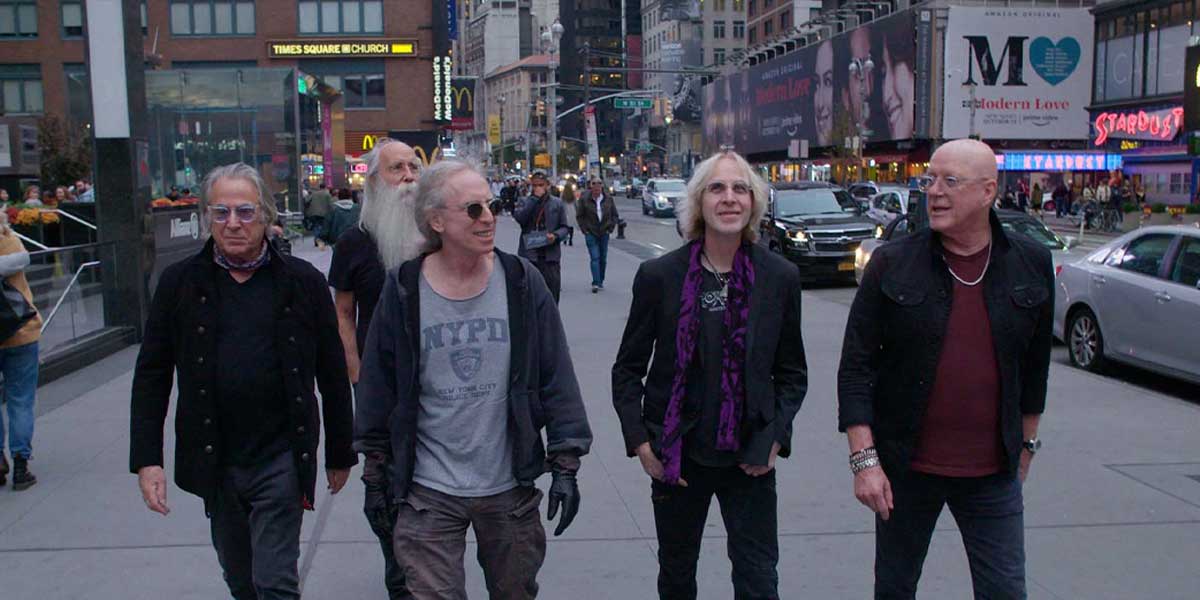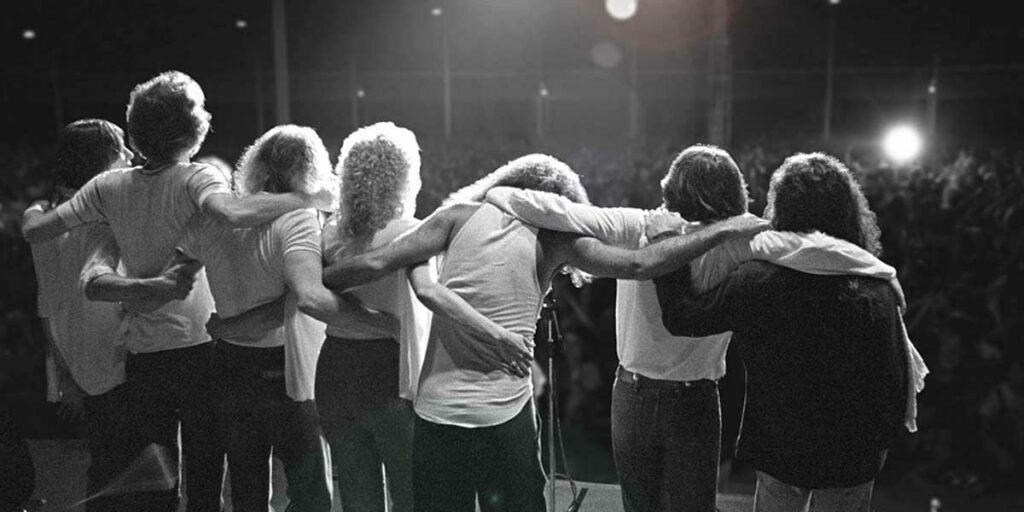We interview Immediate Family director Denny Tedesco and the band members to discuss the film, the titular band, and finding success through changing times.
Immediate Family is a new documentary from Denny Tedesco, the director of 2008’s The Wrecking Crew. The film takes a look at musicians Danny Kortchmar, Russ Kunkel, Steve Postell, Leland Sklar, and Waddy Wachtel, who all played in the studio and on tour for some of the most popular artists of the 70s and 80s, including Carole King, James Taylor, Stevie Nicks, Jackson Browne, and many more. Through this documentary, we learn how they achieved their successes, thrived among some of music’s biggest names, and ultimately came together to form their own band, the titular Immediate Family. Though not an exhaustive look at their careers, Immediate Family is effective in making viewers aware of these great talents and providing professional insight on one of music’s most prosperous eras.
Much to our excitement, we sat down for an interview with Tedesco, Postell, Kunkel, Sklar, and Wachtel to dive even deeper into the film. We learned more about how the film came together, the potential prospects of the band, and their advice on finding and maintaining success through changing times.
Denny Tedesco on Filming Immediate Family
A lot of big names are attached to Immediate Family, like Stevie Nicks, Phill Collins, Don Henley, etc. Are there any others that the Immediate Family has worked with but couldn’t get in the film?
Denny Tedesco: What blew me away the most was how there were no gatekeepers in this project. Looking at those names, you may think it could take years to get some of them for an interview. But Russell, Waddy, Leland, or Steve would make a call to a Linda Ronstadt or James Taylor or Carole King, and the response was pretty much instant. The day after meeting with the band, they said Carole could be interviewed in three weeks. That made me panic sweat, because my last film took me 19 years to make, so I thought I had a little more time to learn about this project.
Russell Kunkel: Well, you had to go get a loan.
D.T.: Yes, I did. And then within two months, we had Carole, Linda, Jackson Browne, James Taylor, Phil Collins, and it just went on. What’s crazy is how quickly they jumped on, which says so much about the love these artists have for these guys. There’s sisterhood and brotherhood all the way around. The only person we obviously wish we could have gotten was Warren Zevon, who’s been passed away for a long time now. That’s the sad part, how there were some people we simply couldn’t use.

R.K.: I also wish we could’ve gotten Joe Walsh. That would have been good.
Waddy Wachtel: Bryan Ferry could have been on board with us too.
Leland Sklar: With how many fabulous characters we’ve worked with over the years, the movie could have been six days long.
D.T.: COVID also hit, and then everybody was in real trouble. That was a big deal because for the first six months, we had most of those people mentioned in the can, but we didn’t have the Immediate Family roundtable, or Keith Richards, or some of the others like Don and David Crosby. We had to slowly go out safely and get each one of these guys on film. David and Keith were on Zoom, and I even went to Texas for Don Henley.
The Work and Prospects of The Immediate Family
A lot of you all in the Immediate Family played a pivotal role for other artists. What’s the collaborative environment like now that you’re all in a band as opposed to having someone else in the center stage?
Waddy Wachtel: The collaborative effort is basically the same as it would be when we work for other artists. We all know each other’s roles so well. So, when it comes time to work on our own material, the one whose song it is would be the one we’re paying attention to. I don’t see that big a difference, except for when we finally take our music to the stage and we are the show rather than the artist. One of the things I like about our live performances is how people would say, “Is someone going to sit in?” And we’re like, “No! No one’s sitting in!” Finally, for the first time in our lives, it’s our show. We don’t mean that hostilely to anybody; it’s just that now it’s the way we want it.
When this film is out, a lot more people will be familiar with the band and your individual names. Where do you see the band going because of that, and what do you expect to see come out of this, if anything?
Leland Sklar: We’re just playing this one day at a time. There’s nothing that would be more fun than to be out gigging. We’ve got gigs coming up, we’ve got a cruise that we’re doing and then a bunch of shows in late February, and it’s a joy every time we get to play together. We do have an agency working on stuff now, so it’ll be interesting to see what kind of a bump might happen after the movie. But right now, our real focus is on the movie and a new album that’ll be coming out in February. And then we’ll see what happens with it. This has been such an adventure since Day One for all of us, so we’re just all along for the ride. We’re so proud of what Denny and his team have done, and the new record is wonderful. We’re pretty excited about all of it.
The Immediate Family on Success Through Changing Times
Immediate Family shows your careers in the 80s, when the musical landscape was changing. How did you all react to the even newer trends, genres, and technologies that came after that?
Russell Kunkel: We’re staying wherever we are. The music that was made in the 50s, 60s, and 70s is by far the best list that you could compile. And so, we have no reason to try and compete with somebody. Today, we just stay with the stuff we do really well.
Steve Postell: We all started in an analog world, and we bring that perspective. Now, Waddy and I both have studios, so there’s more opportunity for us to use that newer technology, but I think we all think the way we thought in the beginning. I bring my analog brain to this digital world here, but we have access to stuff that you certainly couldn’t have had at home before.
Waddy Wachtel: I’m also noticing that through all this modernization, technological advancement, hip-hop, etc., there are a lot of bands again now. A lot of guitar bands are out there trying to do exactly what we did all those years ago. There are four-piece bands, lead singers, plenty of guitars … it’s wonderful.
Leland Sklar: The other thing is that the movie focuses on a period, but something you’re not aware of is that nobody stopped. Everybody’s still working after the end of it. I still get calls. I’ve done metal records, grunge-esque records, and I’ve been brought in to work on hip-hop records along with synth bass. So, it’s not like our careers ended at that point. But that was really one of the most remarkable periods of music, the late 60s through the 80s.
But then there’s what Waddy just said, where you sit there and watch old Led Zeppelin, and then everyone looks at Greta Van Fleet going, “Wow, he’s kind of like Zeppelin.” These things are all cyclical, and the pendulums always swing. Sometimes it goes up this way, and then it moves back. So, you try to be aware of what’s going on all the time, especially as a recording studio musician. You’re gonna get called in for these things, so you’ve got to have them in your vocabulary when you’re working.
With social media and the internet, so many people try to be loud and get attention because they feel that’s how success is formed. Do you, as people who have found success and joy without that huge superstardom, have advice for people trying to break into a business but struggling to be in the spotlight?
Russell Kunkel: You gotta be good. That’s the main ingredient. If you’re good, then you’ll get noticed. The problem is people that aren’t good who want to be noticed. The old adage of “It’s not what you know; it’s who you know,” will get you in the door, but once you’re in there, you’ve got to do something.
Leland Sklar: It’s never easy. It requires diligence, persistence, and a thick skin at all times. You have to realize that most of what you’re going to deal with is disappointment, but you have to just let it go and move on.
Waddy Wachtel: Get used to hearing the word “no” and getting past it. You’re going to hear a lot of that word.
L.S.: When we talked to Denny, everything he said was no. But we were persistent.
Denny Tedesco: I’m so much better as a person now that I’ve heard “no” so many times. There’s a great story where this kid wanted to break into acting, and he asked an actor, “What do you think? Should I want to be an actor?” The actor goes, “Don’t do it.” The reason he said that is because if the kid is going to take his advice, he shouldn’t do it. But if he doesn’t listen, then he goes for it. You have to go for it and not listen to someone who tells you not to. It’s the same thing with musicians. You want to be a great musician, but unless you play with each other and know each other, you’re gonna get your gigs from knowing other people.
Same thing with all of us. If you’re a reviewer, you start knowing the publicists and who you’re gonna review, and then something kicks in. For me as a filmmaker, I started as a grip and then started meeting people. And sooner or later, one thing leads to another. It’s a very long journey, but you never give up.
This interview has been edited for length and clarity.
Immediate Family was released in US theaters for a Special One Night Only event on December 12, 2023, and nationwide from December 15, 2023. The movie will be out on digital platforms in the UK from March 3, 2025.

